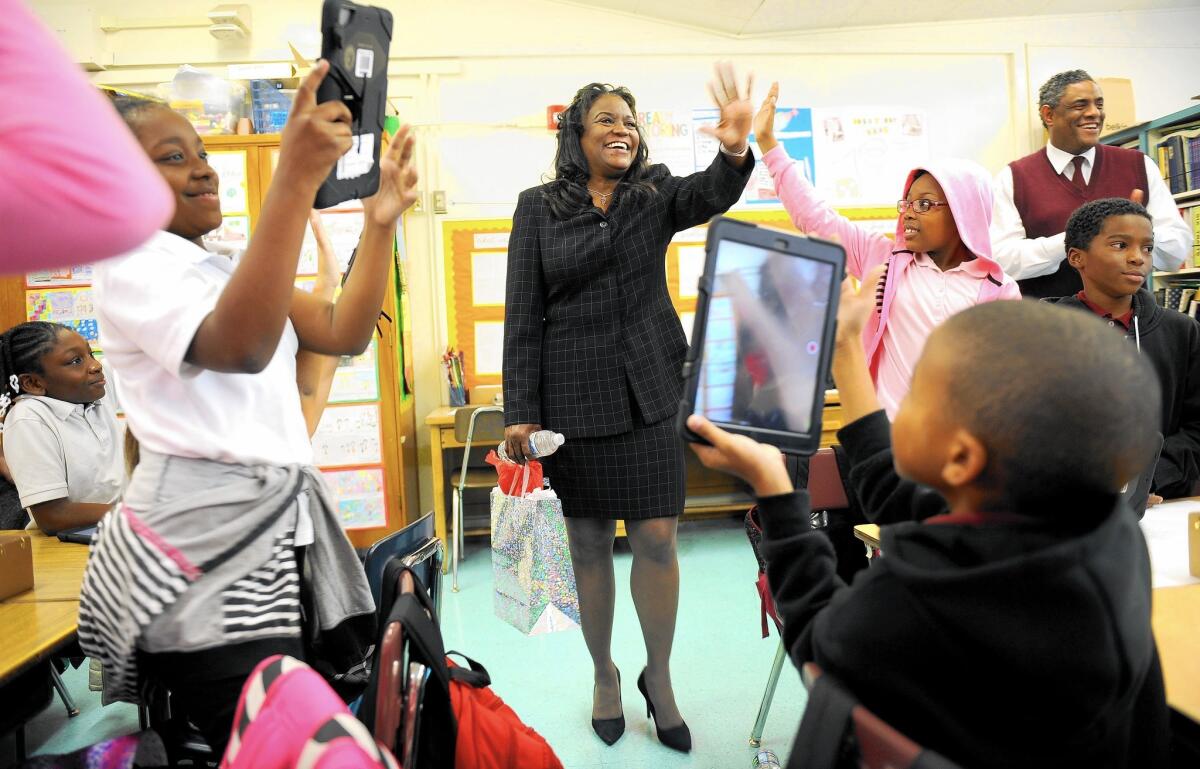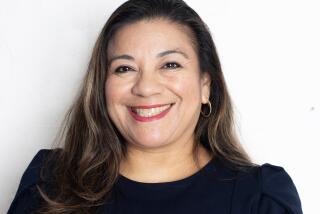From L.A. Unified teacher to superintendent: Who is the real Michelle King?

New Los Angeles Unified School District Supt. Michelle King tours Windsor Hills Elementary School in Los Angeles, which she attended as a child.
At the announcement that Michelle King had been promoted from deputy superintendent to the top leadership position at the huge and troubled Los Angeles Unified School District, the small throng gathered at district headquarters rose to its feet in applause.
The ovation was a “Survivor”-like salute to a member of the tribe. Here was someone who had navigated a high-stakes, politically treacherous enterprise in which, this year alone, 60,000 employees will spend more than $7 billion in taxpayer-supplied money to give 650,000 students a better chance at succeeding in life.
This very district, after all, had educated King since kindergarten. It provided her first job, as a teacher’s aide, while she was still at Palisades High School. And for almost 30 years it has provided her livelihood.
See more of our top stories on Facebook >>
Applause, however, doesn’t necessarily mean she’s the best person for the job.
If there’s not much recent public evidence by which to evaluate King’s suitability for one of the most important positions in education, it’s because 10 years ago the district swallowed King into the upper reaches of its labyrinthine bureaucracy.
In a home movie of her life, that would be the point at which we switch from vibrant color into grainy black and white.
“It is hard to tell who’s the real Michelle because she is always so dutiful to her bosses,” said one source who requested anonymity. “I can’t remember a time when she said: ‘This is what I think.’ It was always the party line.”
King’s earlier career provides some insight.
Take, for example, another show of support that came in 2002, when King walked into her first faculty meeting after being promoted from vice principal to principal at Hamilton High in Los Angeles’ Palms neighborhood.
“The entire faculty burst into a standing ovation,” says retired teacher Shelley Rose. “I’ve never seen it before or since.”
Hamilton, it seems, had been tearing itself apart. The district had set up two magnet schools on the home campus as part of a strategy to lure back white students who had fled public schools. Some staff complained that the combined campus favored the wealthier, whiter magnets.
The staff already had confidence in King. As an assistant principal, she had “bridged all of the factions,” says Merle Price, a former deputy superintendent.
As principal, she reassured the magnets that they could remain independent, while also addressing grievances from the neighborhood school, Price says.

Newly appointed L.A. Unified Supt. Michelle King stops by Century Park Elementary School during a two-day tour of the schools she attended as a child.
She also began to even out class sizes, so that the magnets no longer had far fewer students.
“Michelle united the faculty, boosted morale, and righted the ship almost immediately,” says Barry Smolin, an English teacher. “A lot of it had to do with her calm demeanor, her willingness to hear all sides of an issue and make informed decisions based on sometimes conflicting perspectives — and her genuine concern for students and teachers.”
One way she showed that concern, former colleagues say, was by letting teachers with nonconformist styles do things their way — an approach that has been notoriously foreign to some administrators.
English teacher Dan Victor, now retired, remembers telling King that a schoolwide assembly she’d called conflicted with his plan to prepare students for an Advanced Placement test the next day.
“Why don’t you do what you think is best,” she said.
He kept his students in class.
At least by some important measures her approach worked.
In each of the three years before King became principal, Hamilton’s test scores had fallen short of the state’s target for how much the school was supposed to improve.
After she took charge, the scores surged well past these annual goals.
She didn’t solve all of Hamilton’s problems, though.
The home school continued to perform below the state average and a large divide remained between the higher scores of whites and more prosperous students and those of low-income blacks and Latinos.
That “achievement gap” remains one of the most significant challenges in the district she now runs.
::
In thinking of the forces that shaped her, King recalls the riots of 1992 when, as a young teacher, she stood in her hillside home in South Los Angeles’ largely African American, largely upscale View Park neighborhood, watching large swaths of Los Angeles burn.
Her father had become a lawyer while she was still a child. Her mother worked for the county. Together they provided their daughter with a sheltered life.
“It was assumed and expected you would go to college,” King says. “My father looked at my report cards. We were taught to respect our teachers and that we would get good grades.”
She attended L.A. Unified schools, including Palisades High, where she was a top student and a cheerleader and one of the few blacks at a school whose student body was mainly wealthy and white.
After attending UCLA, her first teaching assignment was in the San Fernando Valley, a world apart from the worst poverty of the L.A. basin.
King was not oblivious to social ills, but her understanding deepened, she said, as she watched the video of police officers beating Rodney King, followed by the trial that acquitted them.
The community rage that followed made an impression, firing up a long-standing instinct to help foundering students push ahead.
In high school she’d become a student aide because she liked helping students who were struggling. She also tutored at UCLA.
Later, she moved through teaching jobs at Porter Junior High and Wright Middle School while shepherding her own three daughters through school.
Sometimes that meant making choices. The first time King was offered the principal’s job at Hamilton she turned it down. Her marriage by then was in trouble, and, even after the divorce, King was determined not to miss back-to-school nights or lose the family’s tradition of long Sunday dinners, at which the girls could talk out the issues of their lives, she says.
When one of her daughters wanted to attend a girls school, King enrolled her in the private Archer School in Brentwood.
King says that watching how the all-girl school empowered her daughter made her believe in the value of single-gender schools — an option she has said she wants to expand in L.A. Unified.
Beyond that, King hasn’t detailed specific new initiatives she’ll suggest for the district, nor has the school board articulated how it plans to measure her success.
In recent years, success has meant remaining in the background and carrying out orders.
“Michelle never really had a chance or opportunity to stand out or share her thoughts,” says longtime PTA leader Scott Folsom. “She is always quiet in meetings. I have never heard her disagree with or question the company line.”
King acknowledges this trait.
“I’ve always followed the direction of my superintendent,” she says. “I might not agree with him, but ultimately I’m a soldier and it’s their ship. It’s their vision and I’m going to follow it.”
And, she says, she’s learned from each superintendent she’s served.
As Supt. Ramon C. Cortines’ chief of staff, and later as chief deputy superintendent, she learned to “communicate and communicate and overly communicate, particularly with the Board of Education.”
As head of operations for Supt. John Deasy, who replaced Cortines, and then was replaced by him after resigning under pressure in October 2014, King learned from “his unrelenting focus on youth and poverty,” she says.
King also cites two readings that have influenced her approach to management.
The first befits a former science teacher: “Turning Research Into Results” by Richard Edward Clark and Fred Estes.
“I believe you gather data before you strike out,” King says.
The other is “Leadership from the Middle: A System Strategy” by Michael Fullan.
Even now that she’s at the top, being in the middle is where she seems most comfortable.
Those who know her best describe a regular-gal charm, a “margarita buddy” who got visibly embarrassed at the raunchier parts of the Spike Lee-produced movie “The Best Man,” a person who likes to bowl and is pretty good at it.
Colleagues say she’s easy to be with, a team player.
King says her devotion to collaboration was instilled early, as a new UCLA graduate in an intern program that shoved an unproven teacher in front of a room of seventh-graders ready to test her.
That trial by fire seared something into her mind. If her colleagues hadn’t rallied to support her, she could have failed, King says. It taught her that educators need to rely on each other.
She wants to apply that same lesson to a fractured school system with a team that now includes parents and district critics. That, she says, is why the board hired her.
“They have charged me with bringing the district together,” she said.
Twitter: @howardblume
Times staff writers Zahira Torres and Sonali Kohli contributed to this report.
MORE FROM EDUCATION
The problem with your lottery tickets and school funding
L.A. is working to count a hidden population — homeless young people
He brokered deals for an empire of California charter schools -- and now faces a felony charge
More to Read
Sign up for Essential California
The most important California stories and recommendations in your inbox every morning.
You may occasionally receive promotional content from the Los Angeles Times.











